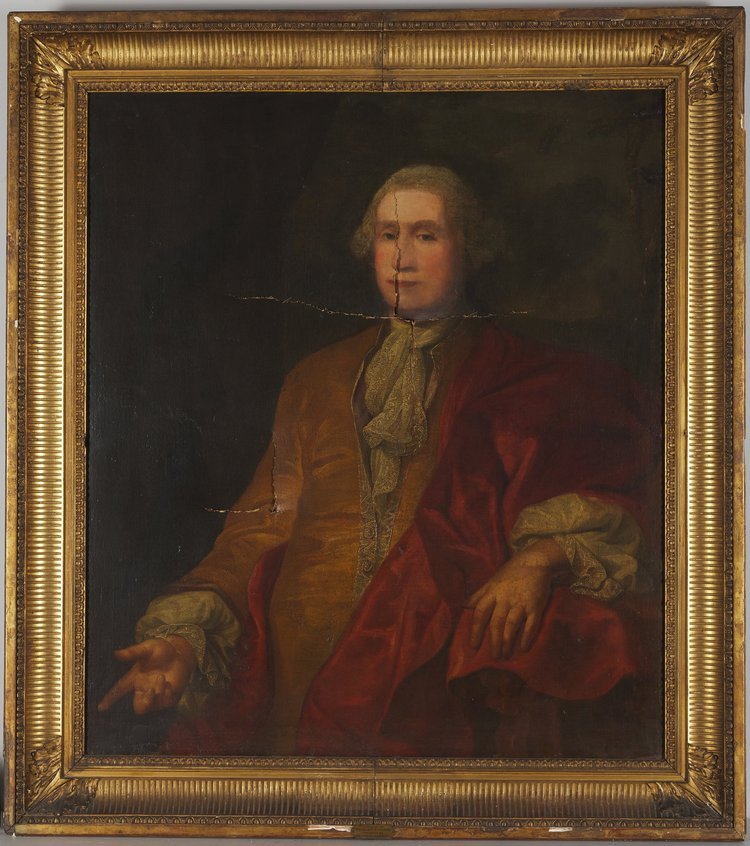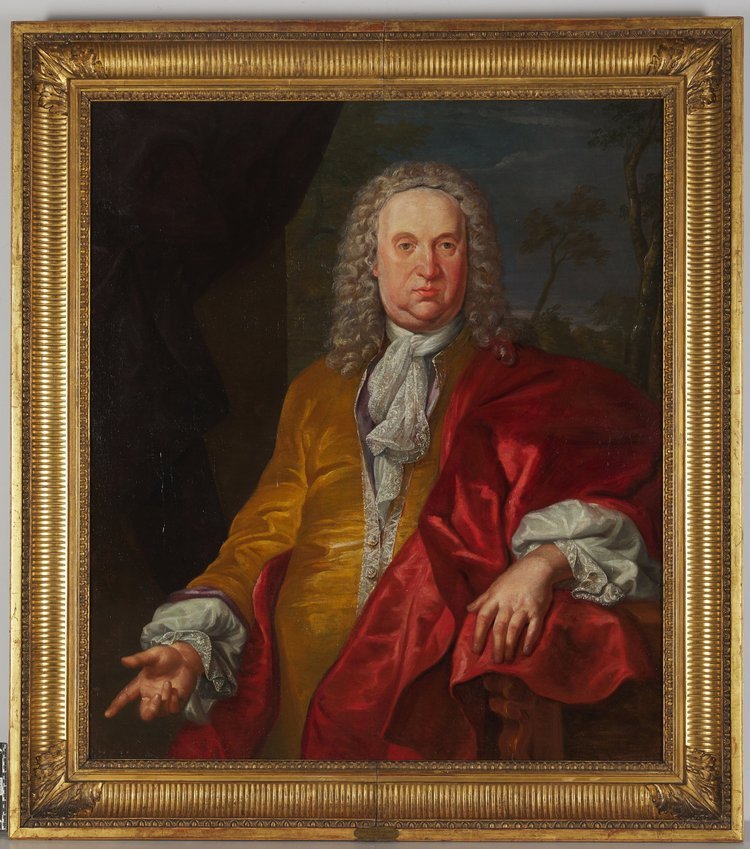George Washington, the first President of the United States, has been the subject of numerous paintings throughout history. He was often portrayed in his military uniform or as a stoic statesman. But this painting of Washington, recently brought to The Center for conservation, didn't quite fit into that imagery. Opulent, colorful clothing is not typically what comes to mind for a portrait of Washington. The folds of the fabric, delicate lace trim, and the detailed painting of the hands made the figure's face feel relatively flat and displayed less skill compared to these other areas of the picture.
Portrait of George Washington before treatment
Years ago, a family member presented this portrait to a prominent social club in memory of a past member. After experiencing puncture damage, the painting desperately needed care. The painting arrived at The Center with two complex tears cutting through the figure's face. But what also caught the attention of our team during the examination was several peculiarities with the paint layer. A considerable amount of the figure's face appeared to be repainted. The painting also appeared to have had several previous campaigns of repainting, further concealed under the thick varnish layer.
Portrait of George Washington before treatment, tear detail
Portrait of George Washington before treatment, tear detail
Portrait of George Washington before treatment, tear detail
Conservation of a painting requires careful consideration and expertise. Senior Paintings Conservator, Michael Young, began by cleaning the thick varnish and repaint, which led to an exciting and rare discovery. As cleaning moved up toward the face, Michael uncovered that beneath the repainted areas, the figure in the portrait may have been originally painted very differently.
Portrait of George Washington before treatment, under UV light
Portrait of George Washington during cleaning, under UV light
Cleaning revealed hair on the shoulder, a longer hairstyle that came down to the shoulders, while the overpainted version's hairstyle stopped at the ears. Our conservation team shared this discovery with the owners of the painting, who, after conversations with our team, decided to proceed with removing the overpainting. It is important to note that this decision was specific to this painting, the expertise of the conservator, and the owner's discretion.
Portrait of George Washington during cleaning, revealing curls on the figure’s shoulder
As cleaning continued, the differences between the overpainting and the original painting became more drastic. The initial figure faced the proper left, while the overpainting figure faced the proper right. This difference led to some very unusual images of the painting during cleaning; a two-faced figure for a time while cleaning continued.
Portrait of George Washington during cleaning, revealing a different portrait beneath
Portrait of George Washington during cleaning, revealing a different portrait beneath
Portrait during cleaning
Portrait during cleaning under UV
Portrait during cleaning
The revealed figure no longer appeared to be George Washington. While the sitter's identity is unknown, the painting's imagery is far more cohesive. The details in the hair curls and the style of the rendering used in the face now fitted that of the hands, lace, and fabric. By comparison, the coherency of the image now amplifies how inconsistent the painting seemed before the overpaint was removed. Now cleaned, the canvas and complex tears were addressed. The two lining canvases were removed, and the areas of flaking paint were consolidated. The tears were then aligned and mended using Japanese tissue patches in order to prepare the canvas for a new lining.
Detail of revealed figure’s face, after conservation is complete.
Portrait of a Man, after treatment unframed
Portrait of a Man, after treatment unframed, verso
Being part of this painting journey provided delight and a pleasant surprise. Although hundreds of paintings are treated in our laboratory annually, a find such as this is a rare experience. We may never discover why this painting came to be hidden under another or how the overpainting came to be. But we do know that no matter the history, this painting is now on a new chapter in its story.
Portrait of a Man, after treatment, reframed
We are proud to share a selection of recent projects focused on the conservation and digitization of archives and other documents for social clubs:
Frederic Clay Bartlett's 56 Panels: A Gothic Chase and Feast Our conservators had the rare privilege to conserve an expansive mural in one of Chicago’s historic buildings.
TCC Restores a Treasured Cliff Dwellers’ Painting The Cliff Dwellers’ John W. Norton painting, "Navaho" (1910) came to The Conservation Center in the fall of 2012 in need of cleaning and reframing.
Saving The Scottish Rite’s Silver Gelatin Prints. One hundred twenty years of dust, grime, soot, and age - the early twentieth-century membership photographs from the Chicago chapter of the Scottish Rite are conserved and reframed.


















